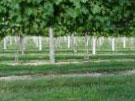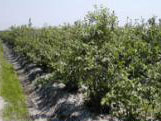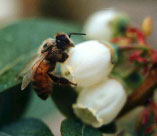Small fruits issues are addressed by conducting research and outreach programs for commercial grape and blueberry growers. Examples of outreach efforts include:
- Grape Expectations - An annual meeting for the commercial grape growers is held in March.
- Blueberry Open House - An annual meeting for commercial blueberry growers is held in February.
Homeowners growing blueberries, grapes, and brambles are also supported by outreach efforts.
Special Projects

Vineyards
New vineyards have been established throughout New Jersey. Dr. Pavlis has imported grape varieties from Italy and is currently cooperating with a nursery to propagate plants in an effort to make them available to vineyard owners.

Blueberries
Dr. Pavlis has changed the methodology of fertilizing commercial blueberries. His research has changed the timing of application, computerized fertilizer recommendations and introduced fertilizing through trickle systems (fertigation) to blueberry growers. The result has been higher yields, better fruit quality and healthier plants.

Blueberry Integrated Pest Management
Cultivated blueberry production in New Jersey ranks second in the nation behind Michigan. Atlantic county is the center of production with almost 80% of the total crop produced here. Growers in our county have always been progressive and tend to adapt to practices which often result in better efficiency. More Information
Frequently Requested Information
Small Fruits: Commercial
- Bramble (Raspberries & Blackberries) Weed Control Recommendations for New Jersey, 2007
- Commercial Blueberry Pest Control Recommendations for New Jersey
- Commercial Bramble Pest Control Recommendations for New Jersey - See Chapter 8 of the Mid-Atlantic Berry Guide
- Commercial Cranberry Pest Control Recommendations for New Jersey
- Commercial Grape Pest Control Recommendations for New Jersey
- Extraction of Blueberry Maggot Larvae from Harvested Blueberry Fruit
- Fescue Grasses as Permanent Cover Between Rows of Blueberry
- New Jersey Commercial Tree Fruit Production Guide
Small Fruits: Gardening and Landscaping
NOTE: Other commercial and homeowner small fruit related fact sheets and bulletins are available through RCRE publications or by contacting our office at 609-625-0056.
Other Resources
![]() For
the Grape/Wine Enthusiast
For
the Grape/Wine Enthusiast
A link to the web site of the American Wine Society, a non-profit national
organization supplying information on grape growing and wine making.
Special Project - Blueberry Integrated Pest Management
 Cultivated blueberry production in New Jersey ranks second in the nation behind Michigan. Atlantic county is the center of production with almost 80% of the total crop produced here. Growers in our county have always been progressive and tend to adapt to practices which often result in better efficiency.
Cultivated blueberry production in New Jersey ranks second in the nation behind Michigan. Atlantic county is the center of production with almost 80% of the total crop produced here. Growers in our county have always been progressive and tend to adapt to practices which often result in better efficiency.
The Rutgers Blueberry Integrated Pest Management program (IPM) has been in place for more than 15 years and has shown a steady growth in the number of participating farms. Since 1995 the number of farms enrolled has more than doubled and this program is now serving 41 growers in Atlantic and Burlington counties. The acreage among these farms represents over 70% of the total blueberry acres in New Jersey.
 Field scouts are generally responsible for data collection with quality control and oversight being provided by Gene Rizio - IPM Program Associate. A team of faculty and specialists at the Marucci Center in Oswego NJ. provide support for quality and direction within the program. Dr. Cesar Rodriguez and Mr. Dean Polk provide leadership in entomology while Dr Peter Oudemans directs the pathology component. Dr Gary Pavlis, the Atlantic County Extension Agent supports the program with horticultural and nutritional direction.
Field scouts are generally responsible for data collection with quality control and oversight being provided by Gene Rizio - IPM Program Associate. A team of faculty and specialists at the Marucci Center in Oswego NJ. provide support for quality and direction within the program. Dr. Cesar Rodriguez and Mr. Dean Polk provide leadership in entomology while Dr Peter Oudemans directs the pathology component. Dr Gary Pavlis, the Atlantic County Extension Agent supports the program with horticultural and nutritional direction.
Numerous farm visits made through the growing season yield useful data which growers use to make better management decisions. Whether the decision was to add a spray to reduce injury, schedule optimum timing for sprays, or deleting a spray which was not needed, this guidance during the busy growing season helps to improve farm efficiency in many ways. On average, growers in this program using IPM practices save about $100/acre on pesticide costs.
Reduced pesticide use also contributes to improved environmental conditions. Through this program growers are able to make better use of “lower risk” pesticides which are gradually replacing some of the older traditional chemicals, thus preserving beneficial insects that can often assist in the effort to rid infesting crop pests. Trials using more advanced options (such as mating disruption) are conducted so that in some cases no pesticide is used to address specific insect crop threats. Improved farm strategies as these are critical to preserving our ecologically sensitive NJ Pinelands.
Twilight meetings and weekly newsletters are employed to disseminate information collected from the fields. These are tools which have a far reaching effect in that we can service growers not enrolled in the program that may be located outside of New Jersey.
Fertility management is a priority among our participants and most of those enrolled in IPM request this service. This season 165 leaf tissue and soil samples were taken for analysis. The results are examined and fertility recommendations are written for each sample. Growers will then be able to further increase overall efficiency through proper fertility treatment.
